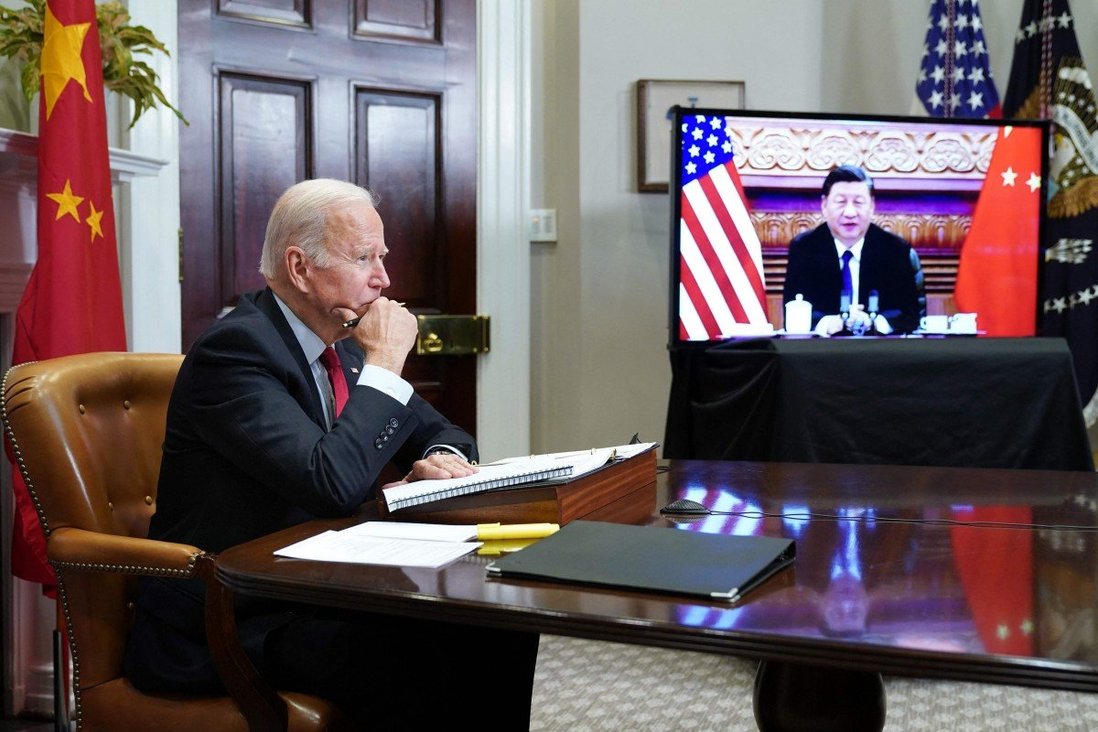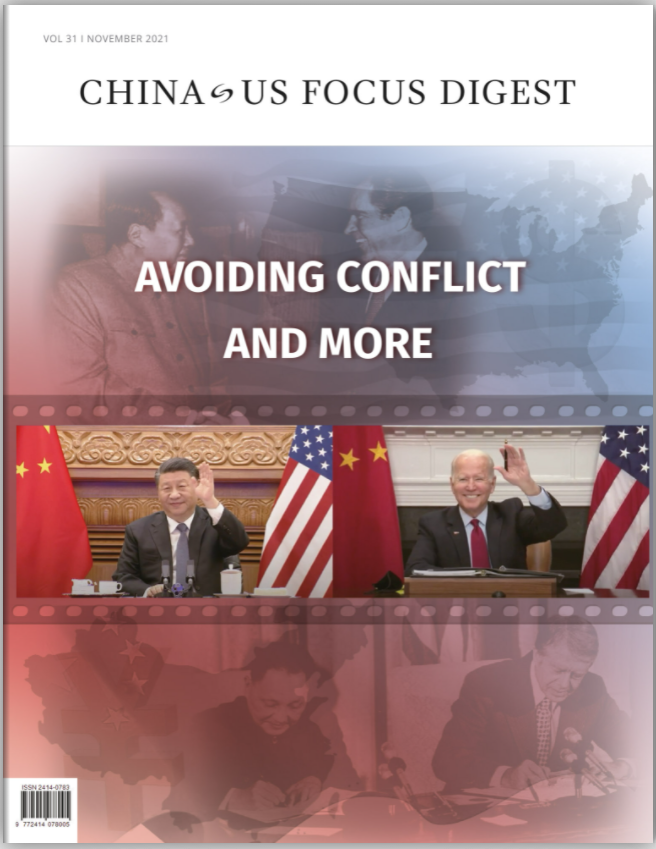
On Nov. 15, American President Joe Biden and Chinese President Xi Jinping, who is also general secretary of the Communist Party of China, engaged in a 3.5-hour video summit meeting from the White House and the Great Hall of the People. The meeting had been in preparation for over a month and ran overtime.
Both leaders were coming off very busy weeks and domestic political successes. Biden had just returned from a successful trip to the G-20 meeting in Rome and COP26 in Glasgow, as well as having just signed into law his landmark $1 trillion infrastructure initiative. For his part, Xi had just presided over the Sixth Plenum of the 19th Central Committee and the adoption of the important Resolution on the Major Achievements and Historical Experience of the Party Over the Past Century.
Both leaders were thus bolstered by recent political successes, but both needed progress in foreign policy — and, for each, the U.S.-China relationship is the most difficult challenge. Ever since Biden took office, the relationship has been strained over a wide variety of issues. Previous meetings — virtual and in person — between senior officials on both sides, and two previous telephone calls between the two heads of state, had failed to arrest the downward spiral in relations. This summit, therefore, offered a unique opportunity to discuss each side’s problems with the other directly at the highest level. Leaders do matter, as they and they alone have the ability to make the toughest decisions, set the tone and strike agreements with their counterparts that are elusive at lower working levels.
Biden made this point when he opened the discussion with Xi by saying: “It seems to me our responsibility as leaders of China and the United States is to ensure that the competition between our two countries does not veer into conflict, whether intended or unintended.” This emphasized two key points: that he defines the relationship as “competitive” and that there is a mutual responsibility to manage this responsibly so that conflict can be avoided. This is not a new message from the American side — “managing competition” has been the consistent framing by the Biden administration since taking office. The Chinese side explicitly rejects this characterization.
Click here to read the latest issue of China-US Focus Digest
The mere fact that the two leaders had this direct discussion is seen as stabilizing. Both sides’ post-summit readouts used coded diplomatic language that signaled some positivity. Xinhua News Agency described it as “candid, constructive, substantive, and positive.” It added: “The meeting helps increase mutual understanding, adds to the positive expectation of the international community for this relationship, and sends a powerful message to the two countries and the world.”
Chinese Vice Minister of Foreign Affairs Xie Feng also seemed to echo Biden’s concern about the need and mutual responsibility to establish mechanisms to keep frictions from hemorrhaging: “Managing differences and sensitive issues in a constructive way to prevent China-U.S. relations from getting derailed or out of control. … What matters is to manage differences in a constructive manner and to prevent them from getting magnified or escalated.” From statements like this it seems that the Chinese side has come around to accepting the “managed” part — but not the “competition” part — of the American conceptual framing.
As for specific issues that the two presidents discussed, they included global governance concerns such as climate change, global energy supplies, disrupted supply chains, the continuing COVID-19 public health pandemic and global macroeconomic stabilization. They also discussed hot spot regional issues — specifically North Korea, Iran and Afghanistan. For his part, according to the White House readout, “President Biden raised concerns about the PRC’s practices in Xinjiang, Tibet, and Hong Kong, as well as human rights more broadly.” Biden also accused China of “unfair trade and economic practices,” while emphasizing the need to maintain a “free and open Indo-Pacific.” In the latter context, Biden emphasized the importance of “upholding out commitments in the region.” The Chinese Xinhua readout, however, reported: “Biden reiterated that the U.S. does not seek to change China’s system, the revitalization of its alliances are not anti-China, and the US has no intention to have a conflict with China.”
The two sides also hinted at the possibility of beginning “talks about talks” concerning “strategic stability” — a code word for nuclear weapons. There have been reports and growing concern in the United States of late about China’s building hundreds of ICBM silos (as detected by satellites) and likely tripling its deployed nuclear weapons by 2030.
The two presidents also touched on the volatile and sensitive issue of Taiwan. This time, Biden stuck to traditional language about the continuing U.S. commitment to the “One China” policy as “guided by the Taiwan Relations Act, the three joint communiques, and the Six Assurances” and said “the United States strongly opposes unilateral efforts to change the status quo or undermine peace and stability across the Taiwan Strait.” Unfortunately, while Biden remained tightly scripted concerning the Taiwan question during the summit with Xi, the very next day, while visiting New Hampshire, he once again contradicted himself (as he had a few weeks previously, when he declared that the U.S. had a “commitment” to defend Taiwan) by saying that Taiwan “makes its own decisions and is independent.”
For his part, President Xi reiterated China’s “principled position on the Taiwan question.” But Xi went further by saying: “The Taiwan authorities look for U.S. support for their independence agenda, as well as the intention of some Americans to use Taiwan to contain China.” Then Xi issued a blunt warning: “Such moves are extremely dangerous, just like playing with fire. Whoever plays with fire will get burned.”
The day after the summit, it was announced that both sides had agreed to resume disrupted journalistic protocols. Chinese journalists in America would again receive multiple-entry, one-year visas, while The New York Times, Wall Street Journal, and Washington Post would be permitted to resume operations in China. The Chinese side also agreed to repatriate seven Chinese nationals (among a very large number) from U.S. custody.
All in all, though, the exchanges did seem to be productive, straightforward, and constructive. This is good. It is stabilizing and provides a basis for continued discussions — and hopefully a path toward managing differences.

